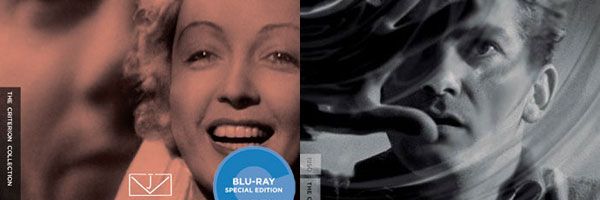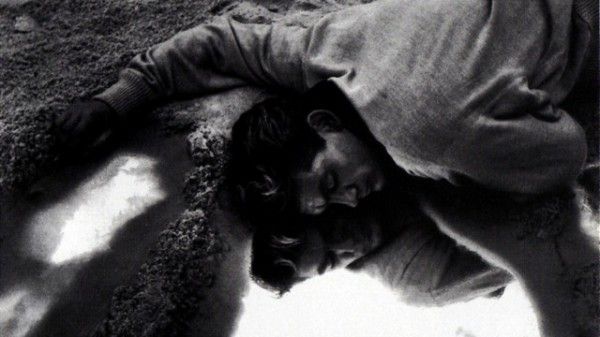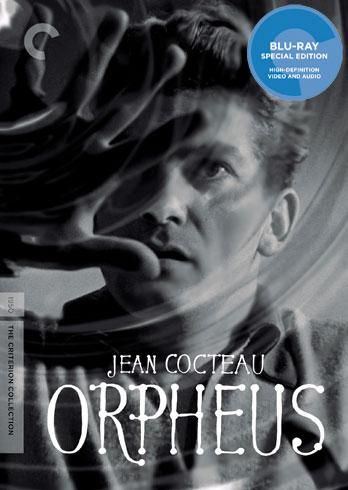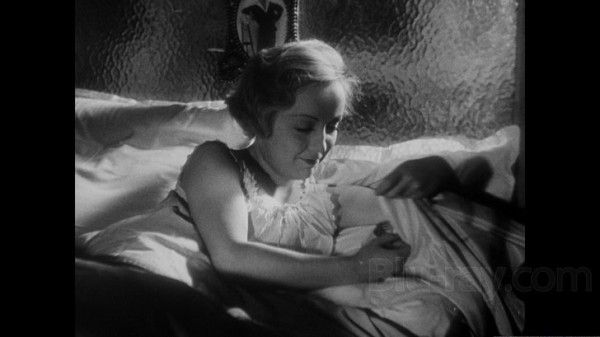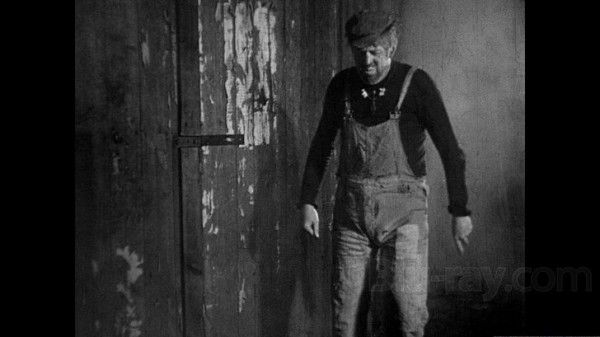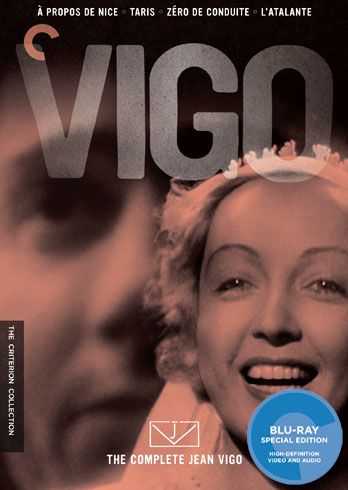Jean Cocteau and Jean Vigo are two of the great towers of French cinema. Pre-New Wave, the two inspired filmmakers like Francois Truffaut and Jean-Luc Godard with their different approaches. Vigo was an upstart filmmaker who died young and left an indelible impression, while Cocteau was a poet, playwright, painter, and all around artiste. All of Vigo’s films are collected in the Criterion Collection’s release The Complete Jean Vigo, while Orpheus – arguably Cocteau’s masterwork – has been upgraded for Blu-ray. Our review of The Complete Jean Vigo and Orpheus on Blu-ray follow after the jump.
Jean Cocteau’s film career is practically defined by two works: Beauty and the Beast and Orpheus. The latter was part of his Orphic trilogy – started with the short film Blood of a Poet and concluded with The Testament of Orpheus. Both are worth seeing, but Orpheus stands on its own, and works just as well with none of that context. Cocteau as a filmmaker has these high points, but his body of work is uneven as a filmmaker.
Orpheus is named after its main character (Jean Marias) - an aging poet who feels as though he’s now past his prime (youth was a concern of the director’s). His wife Eurydice (Marie Dea) is with child, but after a young poet dies (tying it into Blood of a Poet) Orpheus comes in contact with death (Maria Casares) and her driver Heurtebise (François Périer). From Heurtebise’s (death’s) car Orpheus hears the most magical of sayings and phrases, and wants to stay in the vehicle with the radio on at all times (the call of death) while ignoring his wife, whom Heurtebise falls for. Orpheus is so engaged he doesn’t notice his wife when she goes out and is killed by a motorist – the cyclists who also ran over the poet. Orpheus goes to the afterworld to bring his wife back, but on one condition – he can’t look at her. It turns out that death has fallen for Orpheus as well.
Cocteau excused his use of fantasy in Beauty and the Beast, but here he incorporates myth into real world settings. The result is a film that fits the modern definitions of “self-aware” but without ever feeling cutesy about it. Cocteau - like all great artists – was a narcissist, and so the film is partly about himself, and his fear of age and death, and his attraction to both youth and death. But it works because it’s a love story about people who can’t be together – and since Cocteau was a homosexual, that was something he was probably all too aware of.
But though based on an old myth, the film has a jazzy feel – which is matched by the film’s music. It’s jaunty and fun without ever being fey or twee. Part of that charm comes from the old school tricks that Cocteau uses to convey the different world of the dead. From reverse photography to using different angles to make people roll across a set instead of walk across it, Cocteau’s visual language is playful without ever feeling gimmicky. Like Georges Méliès, he loved magic and applied those trick to whatever he did.
The Criterion Blu-ray of Orpheus presents the film in a perfect transfer in the film’s original aspect ratio (1.33:1) and with a 2.0 monaural soundtrack. Previously issued in a Criterion box set of Cocteau films, this is a decidedly better transfer, and a way more elaborate presentation. The film comes with a commentary by James S. Williams done for this release, and as with all Criterion commentaries, it’s a thoughtful and scholarly track. There’s also a ton of extras. The documentary “Jean Cocteau: Autobiography of an Unknown” (67 min.) covers much of the man’s life and films, with numerous interviews with Cocteau over the years. “In Search of Jazz” (18 min.) lets Cocteau talk about his music choices for the film, while filmmaker Marc Caro’s “Jean Cocteau and his Tricks” (13 min.) gets Cocteau’s assistant director Claude Pinoteau to talk about their films together, and how they were made. “40 Minutes with Jean Cocteau” (41 min.) is a 1957 interview with the director at his home. Let us note: Cocteau was not shy about talking about his films. “La Villa Santo-Sospir” (36 min.) was directed by Cocteau, and it’s a tour of his home and the art in his villa. There’s also stills, and the film’s theatrical trailer. The ruins of Saint-Cyr Military Academy (destroyed in WWII) were used in the film, and the disc wraps up with silent footage of the ruins (2 min.)
The Complete Jean Vigo begins with Vigo’s first effort A Propos De Nice, a short film (24 min.) that’s both a travelogue and a film school for the young director. He wanted to shoot the vacation area of Nice, and showcased both how the rich and less well-off behave while there. Here the playful sensibilities that would be refined in later efforts is in bloom, but it’s very much a film about a filmmaker discovering his tools. As with all films in this collection, it comes with a learned commentary by Michael Temple, and the film also comes with a slightly different alternate cut (22 min.) This is followed by Taris (10 min.) where Vigo got to play with photographing a swimmer in action, and what passed for underwater photography. Again, it comes with a Temple commentary.
Zero For Conduct (44 min.) is Vigo’s first major work, and has been viewed as an inspiration on many filmmakers - specifically Lindsay Anderson and his film If… The film is about children (probably age ten) who go to school, and find the headmaster and their teachers so obnoxious they stage a revolt. Zero marks where Vigo (finally doing a fictional narrative) and his sensibilities come into focus (at least as we know them through his limited output). It’s a very spirited effort, it engages the kids as heroes, and embraces that anarchy that comes from children’s play.
From the get go, the film aligns your sympathies with the children – from incompetent teachers, to the headmaster – who is played by a dwarf. The headmaster is looking for a child to spy on the troublemakers, and that’s enough to incite anyone. The boys make a pirate flag, and break a bunch of pillows to signal their revolution, and then egg the up and ups. The child actors are good for what amounts to a bunch of amateurs, and as a short piece it’s thrilling to see it come to its end. Michel Gondry made a tribute video to Vigo (included on the disc), and the influence is inarguable.
Vigo’s sole feature-length film is L’Atalante. Jean (Jean Daste) is a sailor who marries Juliette (Dita Parlo), and takes her to live on his ship with the captain Pere Jules (Michel Simon) a cabin boy and any number of cats and kittens. As the two look for conjugal bliss, they find themselves struggling to be alone, but also the seams of their marriage are already showing. When they hit Paris it’s Jules who gets to go, Stuck on the boat frustrates Juliette so she sneaks out on her own. Jean is unsure if she’ll return as a country girl unused to the big city ways, and she has her own adventure – going out dancing, and encountering big city crime. But there is hope.
Seemingly modeled on Sunrise, the film is about love, but also the sense of getting to know someone after the marriage. Their relationship seems to be a rushed affair, and the call of the big city is much like the marriage for Juliette – a chance to escape. The film is loaded with poetic moments (one of the film’s big inventions is the idea that you can see your true love if you hold your head under water), and things of whimsy – like the captain trying to play a record with his finger. When music starts, he’s surprised, and then gives it another go. The reveal is priceless. And then there’s the cats. All these things would seem like forced quirk in modern cinema, but Vigo’s gentle touch suggests something purer. And though it may have been derived partly from Sunrise, Vigo’s touch is much simpler, and much more joyful. It’s hard to say if the melancholy of the film is due to the story (this couple are not necessarily set for life, but have only overcome a small hurdle), or that its director was dying while he made it, and may have killed himself by shooting it as he did (he died of tuberculosis, they shot on a boat). It’s a vibrant work, and has been celebrated for at least half a century (which took some time - the film was not heralded initially as a masterpiece, though the critical community and filmmakers like Francois Truffaut rallied around it). But you can trace a lot of filmmakers through this work, including Truffaut and Bertolucci – who paid homage to the film in his Last Tango in Paris – and Frederico Fellini, whose La Strada was modeled on it.
The Criterion Collection presents all of these on one Blu-ray disc in their original aspect ratio (1.33:1) and in 2.0 monaural sound, and all come with commentaries by Michael Temple. When dealing with films this old, it’s film specific in terms of quality, but the shorts look good, and L’Atalante shines in this transfer. There’s a tribute by Michel Gondry (1 min.), and an episode of “Cineastes de notre temps” (98 min.) that talks to his collaborators about the director. Truffaut and Eric Rohmer also celebrate the director in a conversation about L’Atalante (18 min.). L’Atalante was cut from 89 minutes to 65 minutes, and “Les Voyages de Latalante” (40 min.) essays how the film was both butchered and saved. Finally there’s “Otar Iosseliani on Vigo” (20 min.), which lets the Georgian filmmaker talk about the influence Vigo had over his work.

